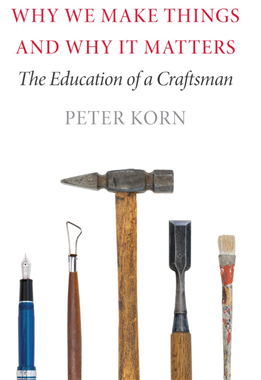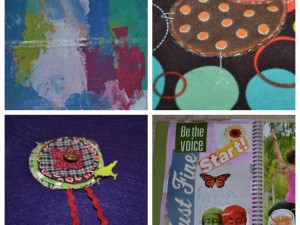Affiliate links may be included for your convenience. View our privacy and affiliates policy for details.
Sometimes when I’m at the library for a specific purpose (like picking up a book for my Reading Women project) I can’t resist browsing a little bit, particularly in the nonfiction section.
So it was that the book Why We Make Things and Why It Matters: The Education of a Craftsman by Peter Korn ended up coming home with me. Korn is a self-taught woodworker who founded the Center for Furniture Craftsmanship in Maine.
His book is part memoir, part philosophical treatise. He ruminates on the questions of the title and rejects the notion he had when younger that being able to make a perfect thing would reflect having a perfect life. (News flash: being good at a craft doesn’t make you good at life; great makers are as messed up as everyone else.)
But crafters and makers maybe are a little more connected to what is meaningful and important in life, at least in his view.
There is a deep centeredness in trusting one’s hands, mind, and imagination to work as a single, well-tuned instrument, a centeredness that touches the very essence of fulfillment. What better way to inhabit one’s selfhood to the maximum than exercising one’s innate human capabilities productively and powerfully, like an engine firing smoothly on all pistons?
I think I agree with that. Maybe it’s just the nature of making things, which gives you all this time where you’re engaged but in a way not really thinking (at least when it comes to mindless, repetitive skills like knitting, crochet, cross stitch and the like; not much of woodworking is so mindless).
You have to get mindless to get mindful. Craft gives your mind time to think about and work on those kinds of bigger issues, and for those inclined to name some higher power, being creative yourself can connect you more with that because you can say, “yeah, me, too.”
And there is power in that. There’s also the silent connection to prior generations of makers and artisans, the people who first learned to do these things, to take stick and string and make magic.
[Tweet “Making connects us to the artists of the past, and to ourselves. It’s important.”]
Those people who refined techniques and developed styles, taught others who added their own spin and so on, down to us., tasked with again making the craft new, making it our own and passing it on to the next generations so that the work of creating can continue anew and again.
Here, I think, is the hidden miracle at the heart of the ordinary in every field of art: creative work is an experiment through which the maker seeks new ways to envision human potential, using himself as the laboratory.
I don’t think this book radically changed my ideas about why making is important, and it certainly made my eyes glaze over from time to time, but I love to read and think about this kind of stuff.
I think it’s vitally important to have makers, crafters and artisans in this time of such rampant consumerism. I think it’s right to say no to buying when you can make or make do or mend. These are the values and the skills I want my kid to have.
What about you? Are you a maker? Do you think it’s important? I’d love to hear what you think.




1 Comment
I like that first quote. For some odd reason, it sounds an awful lot like the Montessori method! If that’s the case, I wonder if I’m not a crafter of children, and my son a crafter of his future. I don’t know even if what I’m saying makes sense because this is quite deep. Food for thought!